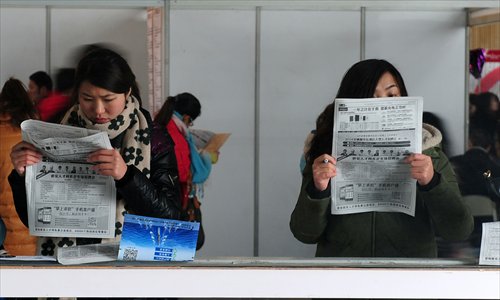More children, fewer jobs

Two young women look for jobs at a job fair in Hefei, Anhui Province on Sunday. The fair was advertising for over 30,000 vacancies. Photo: CFP
For six months, Lin Qiao has been searching in vain for a job, seeking opportunities in East China's Zhejiang Province. But now that the province has relaxed the family planning policy, she fears her job prospects have become even bleaker.
"An interviewer asked me if I was going to have two children and I did not know how to answer," said Lin, who is an only child and is allowed to have a second baby under the new family planning policy, which went into effect on January 17 in the province.
In one example, after the implementation of the new policy, a Hangzhou-based advertising company altered its recruitment plan to hire three female copywriters to just one.
"It's a small company and we hire many young graduates. If some of them choose to have more than one child, the risk will be too high to handle," said the company's human resources manager, who did not want to be named.
According to the Ministry of Education, a total of 7.27 million university students, such as Lin, will enter the job market this year, 280,000 more than in 2013, a year once labeled the most difficult employment season on record.
This year's employment situation is even more difficult, especially for female graduates who face more competition with other job-seekers as well as the potential for gender discrimination from employers as a result of the relaxed family planning policy.
Mothers' rights
Following Zhejiang's lead, Anhui and Jiangxi provinces have also allowed couples to have a second baby if either parent is from a one-child family.
The governments of Beijing, Guangxi Zhuang Autonomous Region and Jiangsu Province also announced their intentions to relax the policy in March. Other provinces promised changes in the first half of 2014 except for those with populations of over 100 million, such as Henan Province.
China's labor law stipulates that a woman is entitled to maternity leave of no less than 90 days with full pay, to protect women's health. However, the idea of a female employee asking for maternity leave twice may intimidate some employers.
"I have not yet considered how the new family planning policy will influence my employment standards, what I can be sure of is that I don't want my employees to spend too many days in the hospital having babies," said one private company owner who requested anonymity.
Experts pointed out that the new regulations could be a hidden reason for employment discrimination.
"Having children is also making a contribution to society, but they treat us like enemies, which is so unfair," Lin said.
An article published on the Beijing-based Economic Information in November 2013 noted that the relaxation of the policy would increase the labor cost of hiring female employees, which will worsen the employment situation for women.
The article also noted that the gender discrimination is a lasting problem in China and said the authorities have to introduce relevant policies in an effort to better implement the relaxed family planning policy.
Gender discrimination
According to a 2011 report released by the All-China Women's Federation, 56.7 percent of female university students interviewed said there were "fewer job opportunities for them," and a remarkable 91.9 percent said they had suffered gender discrimination from employers.
"Law enforcement authorities should step up, supervise and guide companies in their recruitment activities, or the employment situation for women will become worse," said Huang Yizhi, a Beijing-based lawyer who specializes in gender discrimination.
In 2013, 20 female university students exposed 267 companies that posted recruitment advertisements with "male only" requirements on zhaopin.com, an influential online employment information platform. One of the women, Cao Ju, sued one of the companies individually and won the case.
Cao received 30,000 yuan ($ 4,959) in compensation in what has been called "China's first employment gender discrimination case."
"It was way too difficult and, at the time, I felt I could quit at any minute," Cao said. "Sadly, the general picture has not changed, as it is still impossible for women to safeguard their legal rights most of the time."
Fertility concerns
China's fertility rate, which stood at 3.34 percent in 1970, fell to 1.21 percent in 2012. Population growth dropped from 2.58 percent to 0.495 percent in the same period, according to health authorities.
Chinese authorities relaxed the policy in an effort to increase its fertility rates and combat the problem of aging demographics and labor shortages.
Approximately 15 to 20 million couples will be eligible to have a second child under the new policy, according to Zhai Zhenwu, a professor of demographics from the Renmin University of China.
However, the change of policy may not result in a new baby boom in China, at least not in the short term, as many Chinese women have expressed limited interest in having a second child.
Apart from career concerns, China's parents also considered the soaring prices of housing and education in recent years.
According to a list of the top-10 most expensive cities to raise a child until they graduate from college, which circulated online in July, Beijing was at the top with 2.76 million yuan, just ahead of Shanghai's 2.47 million yuan.
If women are unwilling to have more children due to employment pressure, the government will not be able to fulfill its goal, according to some experts.
Lü Pin, a scholar committed to fighting discrimination against women, said that the government should roll out supporting measures to ease the burden on mothers.
"For example, providing subsidies to mothers who have a second child, offering tax breaks to companies that hire more female employees, and so on," Lü said.